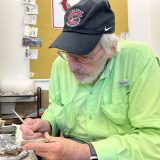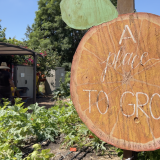Introducing the Grand Challenges Initiative An innovative educational program launching fall 2017 at Schmid College
October 27, 2016
When I reflect upon being a scientist, three words come to mind: fascination, frustration, and exhilaration.
A scientist’s fascination comes from the wonder of trying to understand and decipher the vast complexity of the world around us. Frustration creeps in as we discover how challenging that complexity is, and how unsophisticated some of our scientific tools appear in comparison. Exhilaration emerges as we develop new knowledge and overcome the challenges that Nature’s complexities place before us.
Another truth of being a scientist is that we spend a large amount of our time oscillating between fascination and frustration, and precious little time in the endgame of exhilaration. In other words, the product of our work results only after working diligently for a long time on the process of getting there. Indeed, being a scientist is much more about how you tackle that process; the pathway you choose as you work towards a solution dictates the quality of the product and how rapidly you get there.
It is this reality that caused us here in Schmid College to evaluate the way we teach science, and to consider ways in which we might change the learning process for our students. The product of nearly three years of brainstorming, strategy meetings, logistical analyses, research, planning, and the teaching of experimental courses has led us to the Schmid Grand Challenges Initiative, an innovative educational program launching in the fall of 2017.
Immersive, Student-Driven STEM Learning
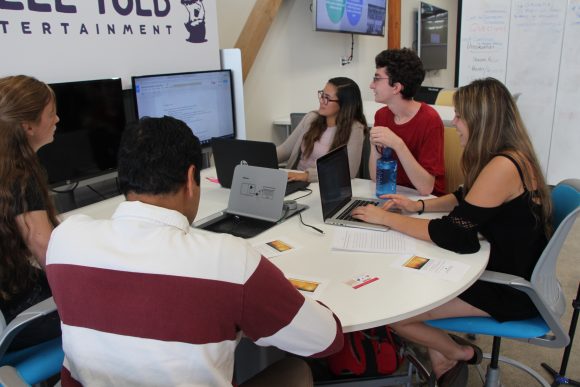 The Grand Challenges Initiative (GCI) is an immersive learning experience in which interdisciplinary teams of first-year students coalesce around the most complex problems of our time. The student-driven teams are then mentored through a self-learning process that promotes their growth as curious, enabled problem solvers and critical thinkers. Designed to span across multiple years of their Chapman experience, the GCI empowers the students to direct the path and growth of their team in a manner not dissimilar to that of an entrepreneurial venture. In this fashion, the students take full ownership of a meaningful portion of their science education.
The Grand Challenges Initiative (GCI) is an immersive learning experience in which interdisciplinary teams of first-year students coalesce around the most complex problems of our time. The student-driven teams are then mentored through a self-learning process that promotes their growth as curious, enabled problem solvers and critical thinkers. Designed to span across multiple years of their Chapman experience, the GCI empowers the students to direct the path and growth of their team in a manner not dissimilar to that of an entrepreneurial venture. In this fashion, the students take full ownership of a meaningful portion of their science education.
In building the program, we have reviewed a number of outstanding team-based programs, problem- based learning approaches, and curricula focused on grand challenges. For example, the higher education landscape in colleges of engineering across the country has become tilted towards the notion that students should be empowered to innovate and create as part of their education, with a tangible product being a desired outcome.
A Focus on Inclusivity
In the sciences, a significant focus has been placed on hands-on, undergraduate research experiences in the laboratory, field, or at the computer. All of these approaches move the needle significantly in the context of student learning, retention, and research success. However, most (if not all) programs are “opt-in” experiences that draw from a small subset of students. Thus, these innovative, interdisciplinary efforts frequently fail to be inclusive of the entire student body, and therefore may not impact student learning across a broad population.
With inclusivity being a primary focus of the GCI, we have constructed a program that engages every first-year and transfer student entering Schmid College in a foundational course, which then continues through a compulsory series of mentored, team-building, learning experiences over the course of two years at Chapman. Student teams can then continue their entrepreneurial journey for the duration of their education, if they so choose.
A Mentored Experience
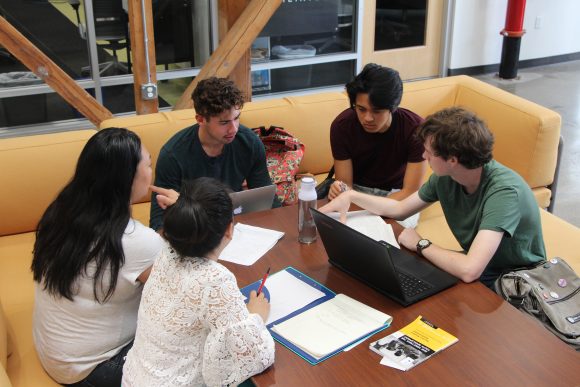 Throughout the program, the faculty mentors guide each team through a tailored process aimed at tackling their specific grand challenge. In this approach, the teams learn to conceptualize, deconstruct, and reassemble the challenges to gain a deep understanding of the problem’s origin and current context, and then pull the challenge apart to reveal the conceptual and practical hurdles that prevent an obvious solution.
Throughout the program, the faculty mentors guide each team through a tailored process aimed at tackling their specific grand challenge. In this approach, the teams learn to conceptualize, deconstruct, and reassemble the challenges to gain a deep understanding of the problem’s origin and current context, and then pull the challenge apart to reveal the conceptual and practical hurdles that prevent an obvious solution.
This process-oriented method forces students to gain a deep understanding of how to approach solutions to problems that seemed daunting and intractable at first. The students oscillate between fascination and frustration in much the same way a professional scientist does, with the exhilaration arriving when the team becomes an authoritative, interdisciplinary voice on the problem at hand.
I have spent nearly two years designing and teaching an experimental course in this model called “the science blender”. I have seen every team tackle their challenges with intensity and creativity, but through a variety of different approaches. One semester, a team composed of a biologist, biochemist, mathematician, and two chemists decided to ‘Reverse-Engineer the Brain’. A twisting path through the brain’s anatomy, neurobiology, functional MRI, monitoring brain development, and something called “the connectome” finally led them to focus on alternative approaches to Alzheimer’s detection and prevention.
The challenge of ‘Measuring an Individual’s Total Health Status’ was given to an eclectic team with members from the fields of film production, public relations and advertising, biology, and history. Starting with the question of “why don’t we live forever?” they wound their way to a fantastical proposal for how to measure a range of key health indicators in a wristwatch-sized device. Whereas their approach is not currently feasible, they discovered a rich array of truths, half-truths, and an immense amount of ignorance related to what it means to be healthy.
With nine different teams being mentored in my class over the last three semesters, I have been amazed at how far students can go when one challenges them with seemingly unattainable goals in the context of a nurturing, mentored experience. The Grand Challenges Initiative will translate this approach to all of Schmid College, providing our students with an exciting and differentiated educational experience.
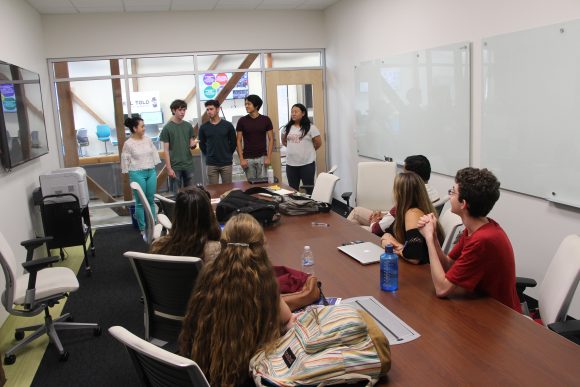 Layered upon the foundation of scientific process and critical thinking, our students will gain a foundation in science ethics, grow leadership and teamwork skills, become better communicators, obtain a new perspective on career pathways, and begin building a professional network outside of the campus environment.
Layered upon the foundation of scientific process and critical thinking, our students will gain a foundation in science ethics, grow leadership and teamwork skills, become better communicators, obtain a new perspective on career pathways, and begin building a professional network outside of the campus environment.
With any luck, this next generation of scientists will spend a lot more time being exhilarated and fascinated by science – and will use their new found skills to help us truly overcome the planet’s most vexing issues.
More information on the Grand Challenges Initiative can be found at: www.chapman.edu/GCI

